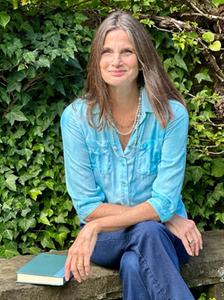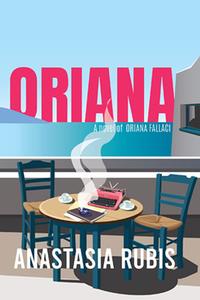
|
|
| Anastasia Rubis | |
Anastasia Rubis's writing has appeared in the New York Times, the Huffington Post, the New York Observer, and various literary journals. One of her stories, "Blue Pools," was included in the anthology Oh, Baby (Creative Nonfiction) and another story, "Girl Falling," was a Notable Essay in Best Essays of 2014. Here she discusses her debut book, Oriana: A Novel of Oriana Fallaci, about the Italian journalist who was best known for her provocative interviews of world leaders, coming March 19 from Delphinium Books.
Who was Oriana Fallaci?
Oriana Fallaci was the best reporter in the world in the 1970s, in a class with Mike Wallace and Barbara Walters as a kick-ass interviewer. She was known for her revealing q&as with world leaders, who often regretted speaking with her, but they did so because it was prestigious. Oriana was totally self-made: born working class in Florence and forced to drop out of university to support her family. Yet she rose to fame as "the greatest interviewer of her day" (Newsweek) and "a legend" (Dick Cavett). She was a rebel and trailblazer. She lived for many years in Manhattan and died in 2006.
What inspired you to write about Fallaci?
Her candid, personal style of journalism, which jumps off the page, and her daring to smash all the rules. She was brilliant, confident, audacious--she could speak her mind, say anything to anybody. And she was glamorous, like Joan Didion, with Italian style and the latest fashions, hairstyle, nail polish. She thrilled me with how strong and assertive a woman could be. Christiane Amanpour has said, "I wanted to be her!" and calls her a role model. Oriana made a huge contribution to journalism--she revolutionized the art of the interview. And she championed human rights and freedom. I wanted to tell that story.
 Why isn't Fallaci better known?
Why isn't Fallaci better known?
In Europe, she's a celebrity. In America, we have short attention spans, or maybe she was too "foreign" or "only" a print journalist, she wasn't on television. In 1973, she did rocket to fame here when she interviewed Henry Kissinger and sadly got him to admit Vietnam was a "useless war." He was embarrassed and called it his worst conversation with any member of the press.
Is the novel timed to come out for Women's History Month?
Yes. Women's contributions are often overlooked by history. We're left with the impression that women are nice, nice--helpers and nurturers--but the truth is, women have always been smart, powerful, making big decisions and leaving their mark. We need to shine a light on more stories of women and their achievements.
Was Fallaci as fierce in her private life as she was in professional life?
No. She was two women. Privately she was sensitive and vulnerable. Most likely she attempted suicide once when her heart was broken. Oriana's story is poignant because she bulldozed her way to the top of her profession yet suffered setbacks in her personal life and had deep regrets. We don't get everything, is my takeaway, even if we are determined and try really, really hard.
In the 1970s, Fallaci wrote about sexism, reproductive choice, and work/life balance. If she were writing today, would she find women's lives improved?
Maybe. But... no. Witness the #metoo movement, the backslide in reproductive rights, the emotional labor carried by women, unequal pay. Oriana said it was tough to be a woman, but it was an adventure that was never boring. She never regretted being a woman, even when she had to work twice as hard as a man to be respected in the newsroom.
Why historical fiction?
I'm fascinated by real life, more than fiction. Give me books and movies "based a true story"--and I'll madly Google afterward to see what was true and what was altered.
Oriana is a love story?
Yes, her big love was Alexander Panagoulis, the Greek hero and poet she met while interviewing. Before that, Oriana had a seven-year relationship with a married war correspondent, but Alexander was her first real partner. They had only three years together. I won't say why.
The novel is described as sexy. Why?
Oriana was 44 and Alexander was 34. She had the big career; he was just out of prison as a political dissident. But she was a workaholic and he introduced her to the pleasures in life: sex in the afternoon, sure, but also swimming in the Aegean Sea and dining at an outdoor taverna under a starry sky.
Did your Greek background play a role in your interest in this story?
Definitely. I grew up summers a few miles down the coast from where Oriana and Alexander first met. He fought against Greece's dictatorship of the '60s and '70s, and I learned the awful history of the military junta that took over my parents' birthplace. Oriana and Alexander are heroes in Greece; in fact, I first found one of her books on a remote Greek island, in a dusty souvenir shop. I'd never seen them in American bookstores.
How did you research Oriana?
I read all her books, articles, etc. and studied her guest appearances on the Dick Cavett and Charlie Rose shows on YouTube. My favorite moment is when she disagrees with Charlie Rose's mansplaining with a "No, no, no, no, no!"--five times in a row. It's a master class in standing up for yourself. I had a blast at Boston University studying her archives, putting on white gloves and handling original manuscripts, letters, newspaper and magazine articles, even her original interview cassettes. When I heard her smoker's voice questioning Walter Cronkite, e.g., her voice was seared into my brain and I was able to bring it to the page.
What are some of your favorite lines from Oriana the character in your novel?
The only thing to do when you're scared is act. Every woman is two women. I was at the height of my profession. But when I looked down from my mountaintop, it was as if I'd climbed the wrong mountain. This is it?
How about examples of real-life Fallaci grilling her interview subjects?
- To Henry Kissinger, she said: To what degree does power fascinate you? Try to be frank.
- To Hugh Hefner, founder of Playboy: I am wondering if you like women, beyond the sex, I mean.
- To Colonel Gaddafi of Libya: I haven't told you that you are a dictator yet. But I will now.
Christiane Amanpour has said Fallaci's interviews should be required reading for all journalists, and I agree. Her collection Interview with History and Power is still in print.
Where did Fallaci get her courage?
At age 14, she fought in the Italian Resistance with her father against Hitler and Mussolini, carrying a grenade on her bicycle and secret messages in her braids. She was in constant danger and forced to surmount her fear. Later, when she had to interview a big shot in the White House or a palace, she was not intimidated. A childhood of fear had burned off her fear.
Please describe your road to publishing.
It took 11 years, two agents, two freelance editors, and many stomach aches until I finally I sold it myself to Delphinium. I am "unrepresented," which sounds like I'm crashing the party. But I couldn't give up, because I was writing about a woman who never gave up. Oriana called herself stubborn; I guess I am, too.
Do you have another novel in the works?
Yes, I'm halfway done with a novel about growing up on a Greek island. But I might ask chatGPT to finish it while I clean my desk or lay on a beach.

